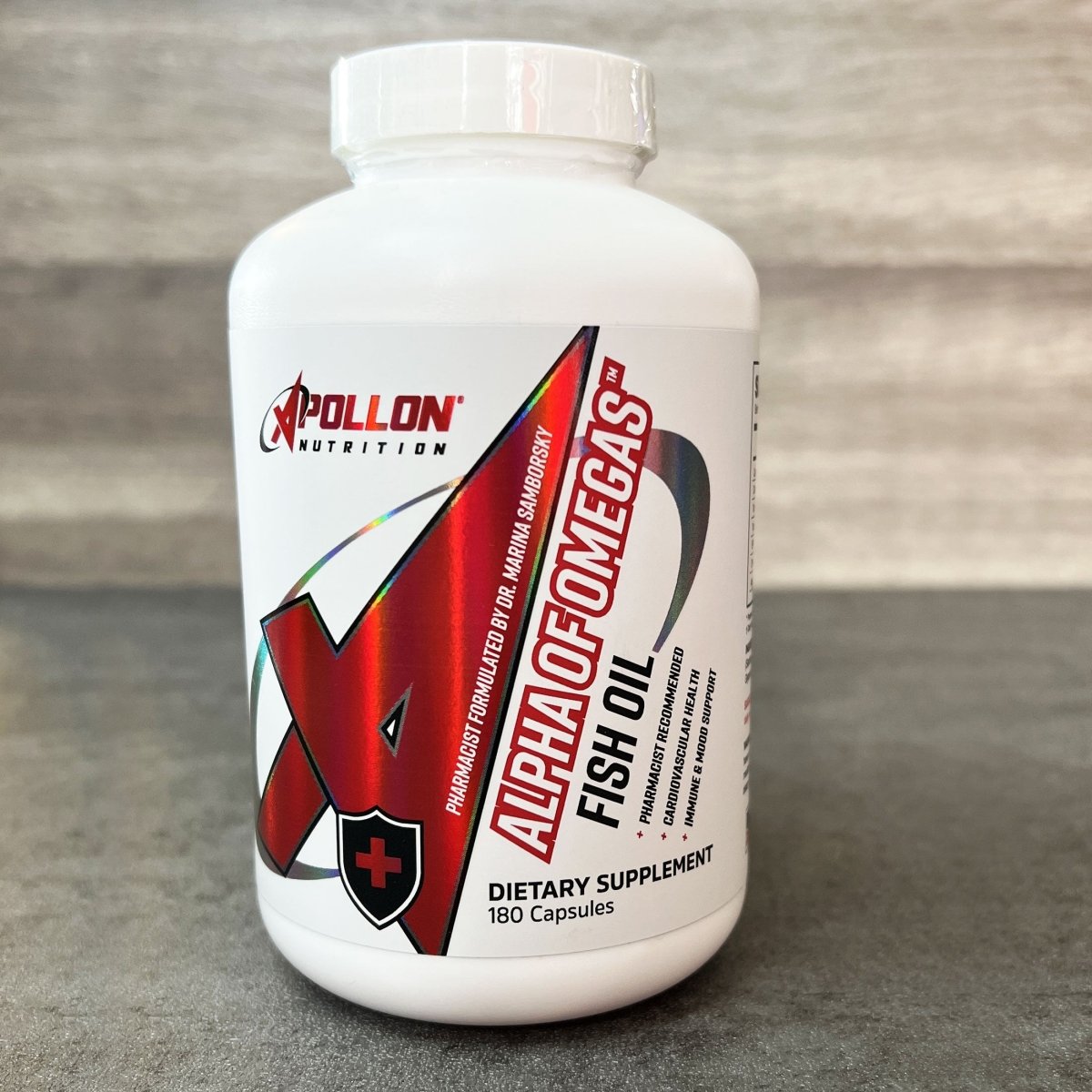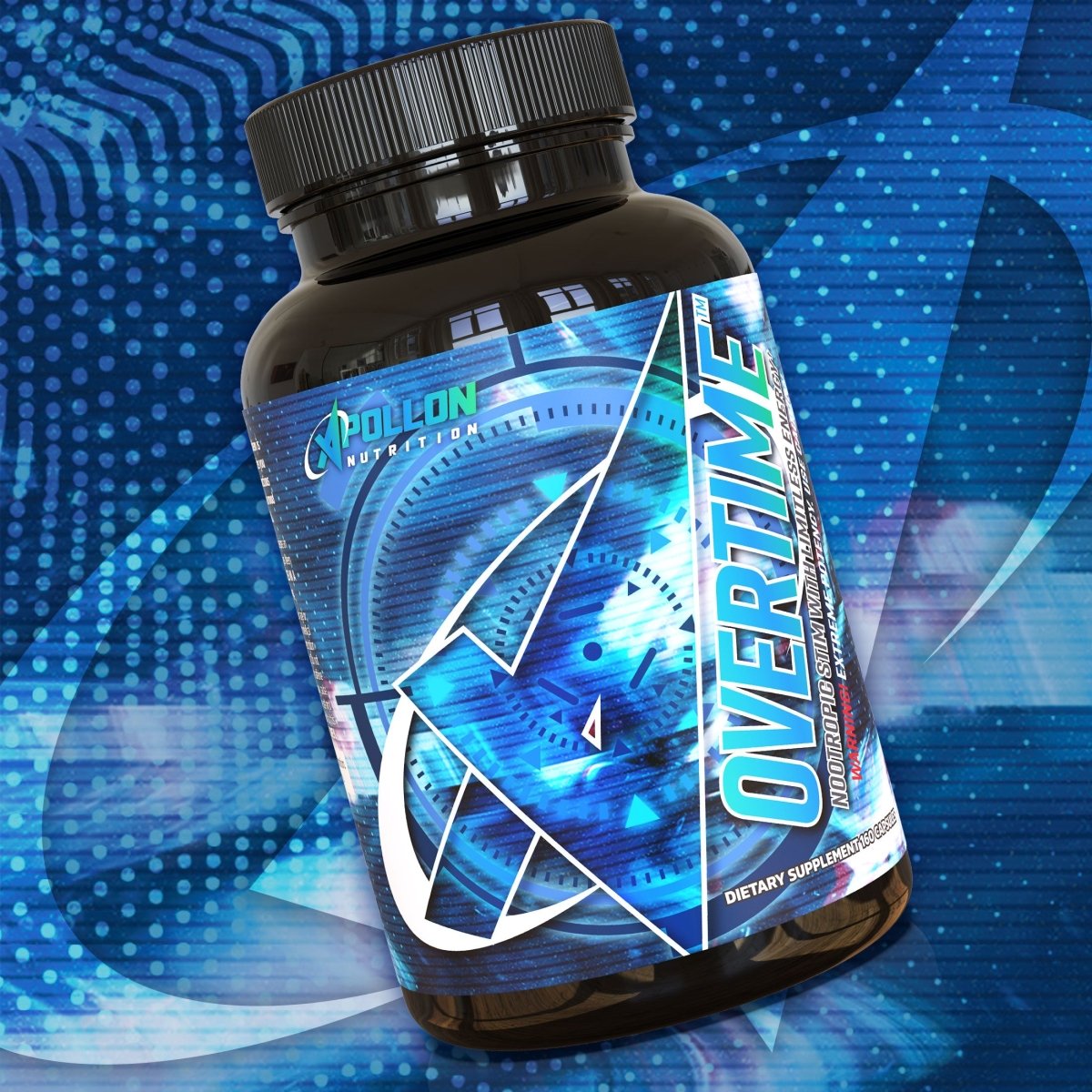Dietary fat has come a long way over the past couple of decades. Truth be told, compared to the low-fat craze of the 80s and 90s, for the better part of the past 20 years, dietary fat has been the “golden child” of the nutrition landscape.
Fat is essential, which means without a sufficient amount of it, your body cannot survive…let alone increase your squat, bench, and deadlift total. Furthermore, fat helps your body absorb nutrients, synthesize numerous hormones, lubricate your joints, nourish healthy skin and hair, and much more.
However, not all fats are the same.
Some fats are better for your body than others, and, in order for your body to thrive it needs a balance of different fats.
Unfortunately, the vast majority of the population is woefully lacking in one of the most critical types of dietary fats -- omega-3 fatty acids.[1]
Omega-3s can be found in a variety of plant and animal foods, but they’re most abundant (in their most bioavailable form) in fatty fish, including salmon, mackerel, sardines, and anchovies.
Given that a lot of people don’t enjoy the taste/texture of seafood and/or can’t regularly afford to spend the amount of money that’s needed to buy high-quality seafood, the average person (possibly you) finds it’s hard to consume adequate amounts of omega-3 fatty acids each day/week.
An obvious solution to this is fish oil supplements.
As simple as that solution seems, the truth is that (like dietary fats) not all fish oil supplements are created equal.
Among the litany of issues that plague fish oil supplements (and the supplement industry, in general) include, but aren’t limited to:
- Poor manufacturing practices
- Spoiled/rancid fish oil
- Low EPA/DHA yields
- Fishy tasting gel caps
- Using high-mercury and/or unsustainable species of fish
Surveying the landscape of crappy quality fish oil and omega-3 supplements, we endeavored to create a superior omega-3 supplement that not only offered premium quality and a potent payload of actual omega-3 fatty acids but also a product that was affordable.
Welcome the Alpha of Omegas.
What is Alpha of Omegas?
Alpha of Omegas is the premier omega-3 supplement on the market, delivering over 2,000mg of a combination of high-quality EPA and DHA per serving.
It is produced from fresh, wild-caught, cold-water Icelandic sardines, herring, mackerel, and anchovies. These species of fish are low in mercury and sustainable.
In other words, if you want to optimize your health and performance while limiting your exposure for disease and dysfunction, then you owe it to yourself to use Alpha of Omegas.
Benefits
- Supports Nutrient Absorption†
- Aids Healthy Hormone Production†
- Supports Cardiovascular Health†
- Bolsters Cognitive Function & Brain Health†
- Smoother Joint Action†
- Aids Muscle Building & Body Recomposition†
What Are Omega-3 Fatty Acids?
Omega-3 fatty acids are a group of essential polyunsaturated fats that must be obtained from the diet as our bodies cannot create them…hence the name, essential.
The three noteworthy omega-3 fatty acids you will see are:
- Eicosapentaenoic acid (EPA)
- Docosahexaenoic acid (DHA)
- Alpha-linoleic acid (ALA)
EPA/DHA are commonly found in animal foods -- fatty fish, red meat, eggs, etc. Though, the most abundant source of omega-3 fatty acids is seafood.
ALA is the plant form of omega-3s, found in walnuts, chia seeds, flax seeds, etc. The body “can” convert ALA into EPA, but the conversion is ridiculously inefficient and has little-to-no impact on DHA, which means you’ll need to consume a lot more of them to get the same “yield” from more bioavailable forms (EPA/DHA).[2]
Why Are Omega-3 Fatty Acids Important?
EPA and DHA impact countless processes in the body.
For instance, EPA is required to produce signaling molecules called eicosanoids, which affect numerous biological processes as well as reduce inflammation. Additional research indicates that EPA is responsible for the mood and well-being benefits associated with omega-3s.[3]
DHA is critical for brain development and function during childhood as well as cognitive function across the lifespan. Deficiencies in DHA are linked to impaired cognitive performance and the onset of cognitive disorders, such as Alzheimer’s Disease.[4]
Supplementing with DHA, in particular, has been shown to have a positive effect on various lifestyle disorders, including high blood pressure, type 2 diabetes, and joint inflammation.[5,6]
Yet another mechanism through which omega-3s benefit brain health are their impact on brain-derived neurotrophic factor (BDNF) -- a protein that supports the growth, development, and maintenance of neurons (brain cells).[7]
FYI, if BDNF sounds familiar, it should…our best-selling nootropic Universal Soldier contains ingredients (including CoffeeBerry) which stimulates BDNF.[8]
Beyond that, omega-3s may help to reduce chronic inflammation as well as serve as a contributor to warding off various maladies.[9]
The current body of evidence suggests that omega-3s may help lower the risk of cardiovascular disease as well as certain forms of cancer. They may even offer a measure of protection against osteoarthritis and depression.
Furthermore, research demonstrates that supplementing with omega-3s may:
- Reduce triglycerides[10,11]
- Support healthy blood pressure[12,13]
- Support muscle building and body recomposition[14,15]
- Boost memory, mood, and cognitive function[16,17]
- Decrease inflammation and exercise-induced muscle soreness[18,19]
- Ease joint action[20]
- Combats weight gain[21]
How Much Omega-3 Fatty Acids Should I Consume?
Studies suggest that a combined intake of 500mg to 1.8g of EPA + DHA per day is sufficient, but additional health benefits have been documented with a combined intake of 3-6 grams per day.[2,3]
The Best Omega-3 Supplement
Omega-3 fatty acids are essential, and research has confirmed that a regular intake of these key fatty acids benefits health, performance, and recovery in a number of ways.
Despite the fact that there are literally thousands of fish oil and omega-3 products on the market, an overwhelming majority are complete crap.
Alpha of Omegas provides over 2,000mg of high-quality EPA + DHA per serving. Each bottle provides 60 full servings, and it can be taken once or twice per day to support, nourish, and fortify your body and mind for optimal performance, recovery, and results!
References
- Kris-Etherton PM, Taylor DS, Yu-Poth S, Huth P, Moriarty K, Fishell V, Hargrove RL, Zhao G, Etherton TD. Polyunsaturated fatty acids in the food chain in the United States. Am J Clin Nutr. 2000 Jan;71(1 Suppl):179S-88S. doi: 10.1093/ajcn/71.1.179S. PMID: 10617969.
- Takic M, Pokimica B, Petrovic-Oggiano G, Popovic T. Effects of Dietary α-Linolenic Acid Treatment and the Efficiency of Its Conversion to Eicosapentaenoic and Docosahexaenoic Acids in Obesity and Related Diseases. Molecules. 2022 Jul 13;27(14):4471. doi: 10.3390/molecules27144471. PMID: 35889342; PMCID: PMC9317994.
- Martins, J. G. (2009). EPA but not DHA appears to be responsible for the efficacy of omega-3 long chain polyunsaturated fatty acid supplementation in depression: evidence from a meta-analysis of randomized controlled trials. Journal of the American College of Nutrition, 28(5), 525–542.
- Mohajeri MH, Troesch B, Weber P. Inadequate supply of vitamins and DHA in the elderly: implications for brain aging and Alzheimer-type dementia. Nutrition. 2015 Feb;31(2):261-75. doi: 10.1016/j.nut.2014.06.016. Epub 2014 Jul 24. PMID: 25592004.
- Horrocks LA, Yeo YK. Health benefits of docosahexaenoic acid (DHA). Pharmacol Res. 1999 Sep;40(3):211-25. doi: 10.1006/phrs.1999.0495. PMID: 10479465.
- Chapkin RS, McMurray DN, Davidson LA, Patil BS, Fan YY, Lupton JR. Bioactive dietary long-chain fatty acids: emerging mechanisms of action. Br J Nutr. 2008 Dec;100(6):1152-7. doi: 10.1017/S0007114508992576. Epub 2008 May 20. PMID: 18492298; PMCID: PMC2648819
- Bhatt, D. L., Steg, P. G., Miller, M., Brinton, E. A., Jacobson, T. A., Ketchum, S. B., Doyle, R. T., Juliano, R. A., Jiao, L., Granowitz, C., Tardif, J.-C., & Ballantyne, C. M. (2018). Cardiovascular Risk Reduction with Icosapent Ethyl for Hypertriglyceridemia. New England Journal of Medicine, 380(1), 11–22. https://doi.org/10.1056/NEJMoa1812792
- Lu MC, Lee IT, Hong LZ, Ben-Arie E, Lin YH, Lin WT, Kao PY, Yang MD, Chan YC. Coffeeberry Activates the CaMKII/CREB/BDNF Pathway, Normalizes Autophagy and Apoptosis Signaling in Nonalcoholic Fatty Liver Rodent Model. Nutrients. 2021 Oct 19;13(10):3652. doi: 10.3390/nu13103652. PMID: 34684653; PMCID: PMC8541094.
- Mozaffarian, D.; Wu, J.H. Omega-3 fatty acids and cardiovascular disease: Effects on risk factors, molecular pathways, and clinical events. J. Am. Coll. Cardiol. 2011, 58, 2047–2067.
- Hu Y, Hu FB, Manson JE. Marine Omega-3 Supplementation and Cardiovascular Disease: An Updated Meta-Analysis of 13 Randomized Controlled Trials Involving 127 477 Participants. J Am Heart Assoc. 2019 Oct;8(19):e013543. doi: 10.1161/JAHA.119.013543. Epub 2019 Sep 30. PMID: 31567003; PMCID: PMC6806028.
- Zhang, X., Ritonja, J. A., Zhou, N., Chen, B. E., & Li, X. (2022). Omega‐3 Polyunsaturated Fatty Acids Intake and Blood Pressure: A Dose‐Response Meta‐Analysis of Randomized Controlled Trials. Journal of the American Heart Association, 11(11), e025071. https://doi.org/10.1161/JAHA.121.025071
- Liao J, Xiong Q, Yin Y, Ling Z, Chen S. The Effects of Fish Oil on Cardiovascular Diseases: Systematical Evaluation and Recent Advance. Front Cardiovasc Med. 2022 Jan 5;8:802306. doi: 10.3389/fcvm.2021.802306. PMID: 35071366; PMCID: PMC8767101.
- Smith GI, Atherton P, Reeds DN, Mohammed BS, Rankin D, Rennie MJ, Mittendorfer B. Omega-3 polyunsaturated fatty acids augment the muscle protein anabolic response to hyperinsulinaemia-hyperaminoacidaemia in healthy young and middle-aged men and women. Clin Sci (Lond). 2011 Sep;121(6):267-78. doi: 10.1042/CS20100597. PMID: 21501117; PMCID: PMC3499967.
- Couet C, Delarue J, Ritz P, Antoine JM, Lamisse F. Effect of dietary fish oil on body fat mass and basal fat oxidation in healthy adults. Int J Obes Relat Metab Disord. 1997 Aug;21(8):637-43. doi: 10.1038/sj.ijo.0800451. PMID: 15481762.
- Narendran R, Frankle WG, Mason NS, Muldoon MF, Moghaddam B (2012) Improved Working Memory but No Effect on Striatal Vesicular Monoamine Transporter Type 2 after Omega-3 Polyunsaturated Fatty Acid Supplementation. PLOS ONE 7(10): e46832. https://doi.org/10.1371/journal.pone.0046832
- Fontani G, Corradeschi F, Felici A, Alfatti F, Migliorini S, Lodi L. Cognitive and physiological effects of Omega-3 polyunsaturated fatty acid supplementation in healthy subjects. Eur J Clin Invest. 2005 Nov;35(11):691-9. doi: 10.1111/j.1365-2362.2005.01570.x. PMID: 16269019.
- Calder PC. Omega-3 fatty acids and inflammatory processes: from molecules to man. Biochem Soc Trans. 2017 Oct 15;45(5):1105-1115. doi: 10.1042/BST20160474. Epub 2017 Sep 12. PMID: 28900017.
- Black KE, Witard OC, Baker D, Healey P, Lewis V, Tavares F, Christensen S, Pease T, Smith B. Adding omega-3 fatty acids to a protein-based supplement during pre-season training results in reduced muscle soreness and the better maintenance of explosive power in professional Rugby Union players. Eur J Sport Sci. 2018 Nov;18(10):1357-1367. doi: 10.1080/17461391.2018.1491626. Epub 2018 Jul 9. PMID: 29985775.
- Olendzki BC, Leung K, Van Buskirk S, Reed G, Zurier RB. Treatment of rheumatoid arthritis with marine and botanical oils: influence on serum lipids. Evid Based Complement Alternat Med. 2011;2011:827286. doi: 10.1155/2011/827286. Epub 2011 Oct 9. PMID: 22007257; PMCID: PMC3189621.
- Buckley JD, Howe PRC. Long-chain omega-3 polyunsaturated fatty acids may be beneficial for reducing obesity-a review. Nutrients. 2010 Dec;2(12):1212-1230. doi: 10.3390/nu2121212. Epub 2010 Dec 9. PMID: 22254005; PMCID: PMC3257626.






Leave a comment
This site is protected by hCaptcha and the hCaptcha Privacy Policy and Terms of Service apply.